May 1st, 2025
This is a more personal icebreaker, please feel free not to share if you are uncomfortable doing so.
What loss in life, be it a person or job or something else, hit you the hardest?
What loss in life, be it a person or job or something else, hit you the hardest?
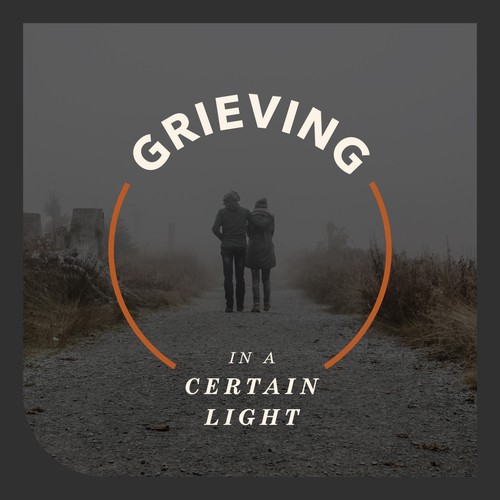
Focus 2 | Grieving is Particular
The grieving is as unique as each individual who goes through it. It's a wrestling process that is so in-the-moment you have no choice but to grapple with the skills and means you have. Thankfully, the God who supports you in your grief can offer help that is as unique as you are.
Now that you've answered the icebreaker question, here's another: this one about unrealized potential.
See what this Spotlight—and series— is focused on.
Tap on the words "Focus 2" in the image below to read this Spotlight's summary.
Tap on the words "Focus 2" in the image below to read this Spotlight's summary.
Hopefully that makes enough sense to get you started. As you do, say this prayer:
Lord,
Grief hits in ways we can't expect or control.
Help us believe you when you say that's ok,
and that you'll be with us as we grieve.
Thank you for letting grief be a way we move forward
instead of a test we must pass or fail.
Amen.
Lord,
Grief hits in ways we can't expect or control.
Help us believe you when you say that's ok,
and that you'll be with us as we grieve.
Thank you for letting grief be a way we move forward
instead of a test we must pass or fail.
Amen.

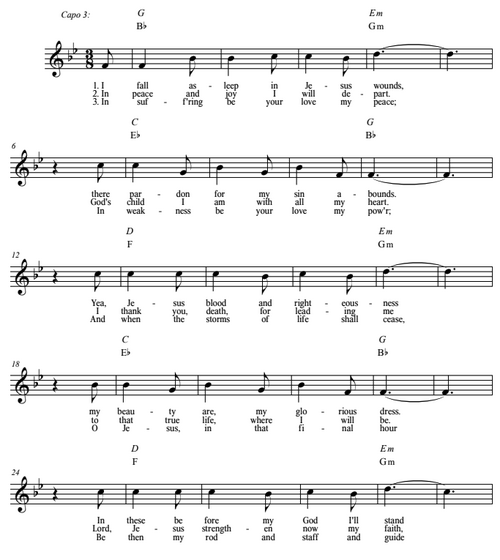
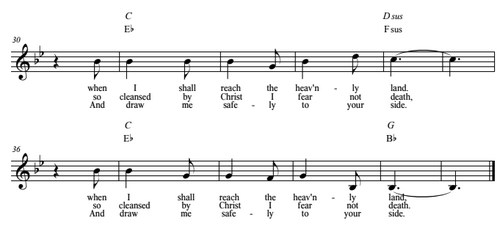
See Jesus react to grief in the story of the death of Lazarus.
Start by reading John 11:1–27 to get some context.
Now a man was sick, Lazarus from Bethany, the village of Mary and her sister Martha. Mary was the one who anointed the Lord with perfume and wiped his feet with her hair, and it was her brother Lazarus who was sick. So the sisters sent a message to him: “Lord, the one you love is sick.”
When Jesus heard it, he said, “This sickness will not end in death but is for the glory of God, so that the Son of God may be glorified through it.” Now Jesus loved Martha, her sister, and Lazarus. So when he heard that he was sick, he stayed two more days in the place where he was. Then after that, he said to the disciples, “Let’s go to Judea again.”
“Rabbi,” the disciples told him, “just now the Jews tried to stone you, and you’re going there again?”
“Aren’t there twelve hours in a day?” Jesus answered. “If anyone walks during the day, he doesn’t stumble, because he sees the light of this world. But if anyone walks during the night, he does stumble, because the light is not in him.”
He said this, and then he told them, “Our friend Lazarus has fallen asleep, but I’m on my way to wake him up.”
Then the disciples said to him, “Lord, if he has fallen asleep, he will get well.”
Jesus, however, was speaking about his death, but they thought he was speaking about natural sleep. So Jesus then told them plainly, “Lazarus has died. I’m glad for you that I wasn’t there so that you may believe. But let’s go to him.”
Then Thomas (called “Twin”) said to his fellow disciples, “Let’s go too so that we may die with him.”
Pause here and pray this prayer aloud:
Lord,
Too often, especially where death is involved,
we struggle to know why things are happening.
We do not see what you see,
we do not know what you know,
and we do not believe what you believe:
that yours is the power,
and the glory,
forever and ever.
Amen.
Start by reading John 11:1–27 to get some context.
Now a man was sick, Lazarus from Bethany, the village of Mary and her sister Martha. Mary was the one who anointed the Lord with perfume and wiped his feet with her hair, and it was her brother Lazarus who was sick. So the sisters sent a message to him: “Lord, the one you love is sick.”
When Jesus heard it, he said, “This sickness will not end in death but is for the glory of God, so that the Son of God may be glorified through it.” Now Jesus loved Martha, her sister, and Lazarus. So when he heard that he was sick, he stayed two more days in the place where he was. Then after that, he said to the disciples, “Let’s go to Judea again.”
“Rabbi,” the disciples told him, “just now the Jews tried to stone you, and you’re going there again?”
“Aren’t there twelve hours in a day?” Jesus answered. “If anyone walks during the day, he doesn’t stumble, because he sees the light of this world. But if anyone walks during the night, he does stumble, because the light is not in him.”
He said this, and then he told them, “Our friend Lazarus has fallen asleep, but I’m on my way to wake him up.”
Then the disciples said to him, “Lord, if he has fallen asleep, he will get well.”
Jesus, however, was speaking about his death, but they thought he was speaking about natural sleep. So Jesus then told them plainly, “Lazarus has died. I’m glad for you that I wasn’t there so that you may believe. But let’s go to him.”
Then Thomas (called “Twin”) said to his fellow disciples, “Let’s go too so that we may die with him.”
Pause here and pray this prayer aloud:
Lord,
Too often, especially where death is involved,
we struggle to know why things are happening.
We do not see what you see,
we do not know what you know,
and we do not believe what you believe:
that yours is the power,
and the glory,
forever and ever.
Amen.
 Continue by reading John 11.
Continue by reading John 11.When Jesus arrived, he found that Lazarus had already been in the tomb four days. Bethany was near Jerusalem (less than two miles away). Many of the Jews had come to Martha and Mary to comfort them about their brother.
As soon as Martha heard that Jesus was coming, she went to meet him, but Mary remained seated in the house. Then Martha said to Jesus, “Lord, if you had been here, my brother wouldn’t have died. Yet even now I know that whatever you ask from God, God will give you.”
“Your brother will rise again,” Jesus told her.
Martha said to him, “I know that he will rise again in the resurrection at the last day.”
Jesus said to her, “I am the resurrection and the life. The one who believes in me, even if he dies, will live. Everyone who lives and believes in me will never die. Do you believe this?”
“Yes, Lord,” she told him, “I believe you are the Messiah, the Son of God, who comes into the world.”
Pause here and pray:
Jesus,
You point Martha to her faith in resurrection,
and in doing so, you bring her to you.
You are the resurrection and the life.
Those who believe in you,
even if they die,
will live.
Increase my faith in the fact that I will never die,
but I will live and believe in you.
I believe you are the Messiah,
the Son of God,
who comes into the world,
who comes to the place we die
and brings a promise of life.
Amen.
Watch this video and then discuss the following question to complete the story of John 11.
Discuss: When in your life have you most valued having a God who weeps with you?
Listen to this song and bask in the grace of that story.
As you listen, imagine yourself as one of the disciples, going along with Jesus into the mourning of Lazarus. People around you grieve. They don't know what to say or do. Things seem upside down and you can hear the murmuring of the people around you. Christ himself has a troubled heart—until you hear the words, "Lazarus, come out!"
As you listen, imagine yourself as one of the disciples, going along with Jesus into the mourning of Lazarus. People around you grieve. They don't know what to say or do. Things seem upside down and you can hear the murmuring of the people around you. Christ himself has a troubled heart—until you hear the words, "Lazarus, come out!"
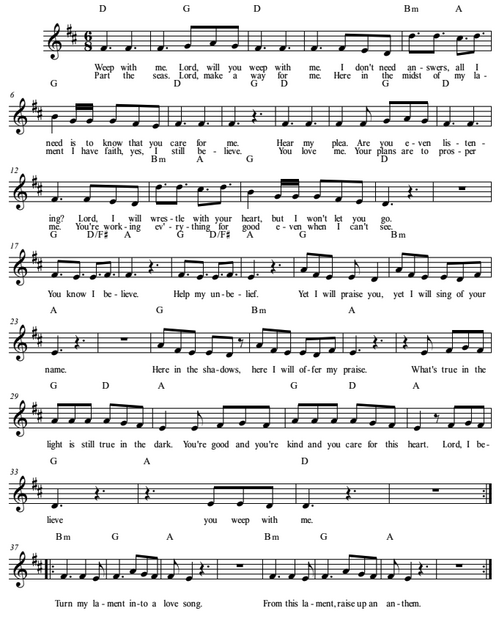

Think about what happens when there is no miracle.
Most stories aren't like John 11. In most stories, Jesus doesn't come and bring your loved one out of the grave just four days after they died. Instead, most stories of death end with the grief of those who are left behind and (in the happiest cases) a complex-but-patient hope that Jesus will, someday, do for all the dead what he did for Lazarus.
That's the best most stories can do, including this one from 2 Samuel 12:13–23:
David responded to Nathan, “I have sinned against the Lord.”
Then Nathan replied to David, “And the Lord has taken away your sin; you will not die. However, because you treated the Lord with such contempt in this matter, the son born to you will die.” Then Nathan went home.
The Lord struck the baby that Uriah’s wife had borne to David, and he became deathly ill. David pleaded with God for the boy. He fasted, went home, and spent the night lying on the ground. The elders of his house stood beside him to get him up from the ground, but he was unwilling and would not eat anything with them.
On the seventh day the baby died. But David’s servants were afraid to tell him the baby was dead. They said, “Look, while the baby was alive, we spoke to him, and he wouldn’t listen to us. So how can we tell him the baby is dead? He may do something desperate.”
When David saw that his servants were whispering to each other, he guessed that the baby was dead. So he asked his servants, “Is the baby dead?”
“He is dead,” they replied.
Then David got up from the ground. He washed, anointed himself, changed his clothes, went to the Lord’s house, and worshiped. Then he went home and requested something to eat. So they served him food, and he ate.
His servants asked him, “Why have you done this? While the baby was alive, you fasted and wept, but when he died, you got up and ate food.”
He answered, “While the baby was alive, I fasted and wept because I thought, ‘Who knows? The Lord may be gracious to me and let him live.’ But now that he is dead, why should I fast? Can I bring him back again? I’ll go to him, but he will never return to me.”
This is a terrible, sad part of a terrible, sad story.
Most stories aren't like John 11. In most stories, Jesus doesn't come and bring your loved one out of the grave just four days after they died. Instead, most stories of death end with the grief of those who are left behind and (in the happiest cases) a complex-but-patient hope that Jesus will, someday, do for all the dead what he did for Lazarus.
That's the best most stories can do, including this one from 2 Samuel 12:13–23:
David responded to Nathan, “I have sinned against the Lord.”
Then Nathan replied to David, “And the Lord has taken away your sin; you will not die. However, because you treated the Lord with such contempt in this matter, the son born to you will die.” Then Nathan went home.
The Lord struck the baby that Uriah’s wife had borne to David, and he became deathly ill. David pleaded with God for the boy. He fasted, went home, and spent the night lying on the ground. The elders of his house stood beside him to get him up from the ground, but he was unwilling and would not eat anything with them.
On the seventh day the baby died. But David’s servants were afraid to tell him the baby was dead. They said, “Look, while the baby was alive, we spoke to him, and he wouldn’t listen to us. So how can we tell him the baby is dead? He may do something desperate.”
When David saw that his servants were whispering to each other, he guessed that the baby was dead. So he asked his servants, “Is the baby dead?”
“He is dead,” they replied.
Then David got up from the ground. He washed, anointed himself, changed his clothes, went to the Lord’s house, and worshiped. Then he went home and requested something to eat. So they served him food, and he ate.
His servants asked him, “Why have you done this? While the baby was alive, you fasted and wept, but when he died, you got up and ate food.”
He answered, “While the baby was alive, I fasted and wept because I thought, ‘Who knows? The Lord may be gracious to me and let him live.’ But now that he is dead, why should I fast? Can I bring him back again? I’ll go to him, but he will never return to me.”
This is a terrible, sad part of a terrible, sad story.
Take this quiz to get some background on this story.
It's a story of David's sin and the death of his child.
It's a story of David's sin and the death of his child.
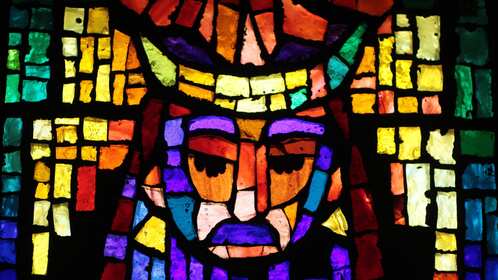
Review David's grieving process as his sin causes his child to die from 2 Samuel 12:15-23.
The Lord struck the baby that Uriah’s wife had borne to David, and he became deathly ill. David pleaded with God for the boy. He fasted, went home, and spent the night lying on the ground. The elders of his house stood beside him to get him up from the ground, but he was unwilling and would not eat anything with them.
On the seventh day the baby died. But David’s servants were afraid to tell him the baby was dead. They said, “Look, while the baby was alive, we spoke to him, and he wouldn’t listen to us. So how can we tell him the baby is dead? He may do something desperate.”
When David saw that his servants were whispering to each other, he guessed that the baby was dead. So he asked his servants, “Is the baby dead?”
“He is dead,” they replied.
Then David got up from the ground. He washed, anointed himself, changed his clothes, went to the Lord’s house, and worshiped. Then he went home and requested something to eat. So they served him food, and he ate.
His servants asked him, “Why have you done this? While the baby was alive, you fasted and wept, but when he died, you got up and ate food.”
He answered, “While the baby was alive, I fasted and wept because I thought, ‘Who knows? The Lord may be gracious to me and let him live.’ But now that he is dead, why should I fast? Can I bring him back again? I’ll go to him, but he will never return to me.”
Discuss David's grief using the following questions.
The Lord struck the baby that Uriah’s wife had borne to David, and he became deathly ill. David pleaded with God for the boy. He fasted, went home, and spent the night lying on the ground. The elders of his house stood beside him to get him up from the ground, but he was unwilling and would not eat anything with them.
On the seventh day the baby died. But David’s servants were afraid to tell him the baby was dead. They said, “Look, while the baby was alive, we spoke to him, and he wouldn’t listen to us. So how can we tell him the baby is dead? He may do something desperate.”
When David saw that his servants were whispering to each other, he guessed that the baby was dead. So he asked his servants, “Is the baby dead?”
“He is dead,” they replied.
Then David got up from the ground. He washed, anointed himself, changed his clothes, went to the Lord’s house, and worshiped. Then he went home and requested something to eat. So they served him food, and he ate.
His servants asked him, “Why have you done this? While the baby was alive, you fasted and wept, but when he died, you got up and ate food.”
He answered, “While the baby was alive, I fasted and wept because I thought, ‘Who knows? The Lord may be gracious to me and let him live.’ But now that he is dead, why should I fast? Can I bring him back again? I’ll go to him, but he will never return to me.”
Discuss David's grief using the following questions.
- Does the way David acts during his son's illness and after his son died seem backwards to you, or does it make sense? Why?
- David would lose four of his sons to early deaths—first this infant son, then his son Amnon would be killed by his other son Absalom, then Absalom would die trying to conspire to steal David's throne, and finally his son Adonijah would succeed in stealing the throne until Solomon (rightful heir and son of Bathsheba) would kill him. All of these deaths are connected to David's sin with Bathsheba How might this have felt like a "fate worse than death" to David?
- It is very, very difficult to grapple with the idea that this baby was struck with disease and death because of the sin of David—a sin the baby had nothing to do with. In fact, the suffering and death of the young and innocent is one of the biggest reasons people give when they deny or reject God. While understanding the mind of God in moments like this is (and should be) a complex topic, start here: how has God the Father gone through this same kind of grief (perhaps a grief even worse)?
- God did not say "Yes" to David's prayers that his son might live. Do you think God approved of David's actions while his son was ill?
- The death of an infant is an heart-wrenching example of the particular challenge of grieving—the pain of unrealized potential. What does it look like to meet that pain with faith in the promise of life after death (as David clearly did in verse 23)?

Watch this video and then share what you've seen be helpful.
Then David comforted his wife Bathsheba; he went to her and slept with her. She gave birth to a son and named him Solomon**. The Lord loved him, and he sent a message through the prophet Nathan, who named him Jedidiah**, because of the Lord.
**The name Solomon means "peace" and the name Jedidiah means "the Lord loves him."
There was forgiveness and comfort for David and Bathsheba. It did not remove the pain, but it helped them process it and find hope in God.
Discuss: What have you seen, heard, or done that is helpful to couples who lose a child?
**The name Solomon means "peace" and the name Jedidiah means "the Lord loves him."
There was forgiveness and comfort for David and Bathsheba. It did not remove the pain, but it helped them process it and find hope in God.
Discuss: What have you seen, heard, or done that is helpful to couples who lose a child?
Feel free to submit a prayer request by filling out the below form.
(If you choose to make your request public, you'll see it display in the Current at the end of the Spotlight along with anyone else who did the same.)
(If you choose to make your request public, you'll see it display in the Current at the end of the Spotlight along with anyone else who did the same.)
Pray through your requests—together—as a group.
After submitting your requests in the above form, take some time to share with your group whatever requests the group might have for this week.
After submitting your requests in the above form, take some time to share with your group whatever requests the group might have for this week.

Sing along with (or listen to) this song to close out this Spotlight.
Feel free to sing along or simply listen. Do what makes you comfortable—but do whatever helps you focus on the song's meaning best.
Feel free to sing along or simply listen. Do what makes you comfortable—but do whatever helps you focus on the song's meaning best.


Let's wrap things up by taking a look at what's Current at Illume.
Tap on the buttons in the frame below to see what’s currently happening at Illume—information on everything from current and upcoming online content to live events and opportunities to serve in the community can all be found here.
Tap on the buttons in the frame below to see what’s currently happening at Illume—information on everything from current and upcoming online content to live events and opportunities to serve in the community can all be found here.
Posted in Grieving in a Certain Light

No Comments